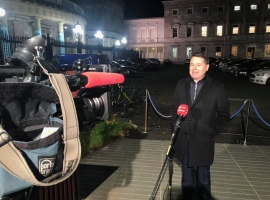
Ireland's central bank raised its 2017 economic growth forecasts for the first time in more than a year on Thursday as it pointed to a broadening domestic-economy recovery despite concerns about Brexit.
Ireland's economy has been the best-performing in the European Union since 2014, but the central bank has for the last year been nudging down its expectations for 2017, anticipating a blow from neighbouring Britain's vote to leave the EU.
So far, though, any impact has been mainly confined to some exporters being hurt by currency depreciation and domestic demand was more than making up for that, the bank said. It raised its forecast for gross domestic product growth to 3.5% from 3.3% three months ago.
That was still more pessimistic than the 4 to 4.25% growth Ireland's finance department pointed to on Wednesday and the 4.4% the central bank initially forecast in January last year, five months before Britain's EU referendum .
But the central bank also raised its GDP forecast for 2018 to 3.2% from 3%, foreseeing both earnings and consumer spending growing by half a percentage point more than it had expected a quarter ago.
It said annual earnings growth of 2.8% in 2017 and 2018, compared with an average forecast for inflation of less than 1%, would constitute significant gains in real terms and provide a further impetus to growth.
"The evidence points to an economy which continues to grow at a healthy pace, supported by strong domestic spending and activity data," Central Bank Chief Economist Gabriel Fagan said in a statement.
"However, risks continue to be on the downside, with the outlook characterised by uncertainty about the external environment, both in relation to Brexit and the changing political and economic policymaking landscape."
Britain is a key trading partner for Ireland, which says it has more to lose in a Brexit than any other EU member.
The central bank has said in its most pessimistic scenario, where increased tariff and non-tariff barriers significantly reduce trade flows between Ireland and the United Kingdom, Irish GDP could be 3.2% lower over a period of 10 years. (Reuters)
Source: www.businessworld.ie
















